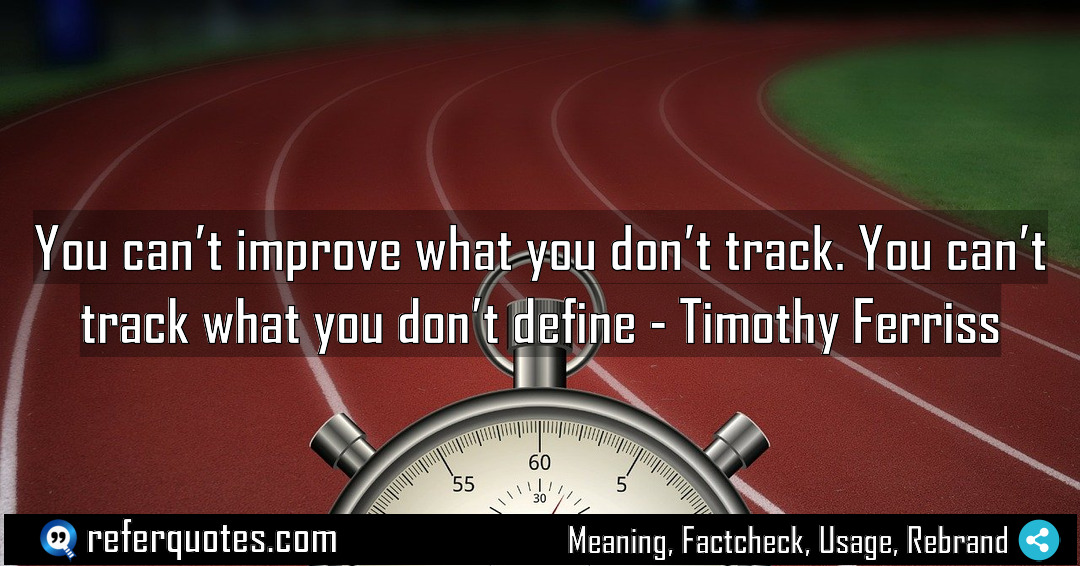You can’t improve what you don’t track… It’s a simple but brutal truth about achieving any meaningful result, whether in business, health, or life.
Share Image Quote:Table of Contents
Meaning
The core message is a chain reaction of accountability: meaningful improvement is impossible without measurement, and measurement is impossible without first creating a clear, specific definition of what you’re even trying to achieve.
Explanation
Look, I’ve seen this play out a thousand times. People say they want to “get healthier” or “grow the business.” But those are just… feelings. Vague aspirations. What Ferriss is really getting at here is the absolute necessity of moving from the abstract to the concrete. You have to define what “healthier” actually means. Is it losing 10 pounds? Is it lowering your blood pressure to 120/80? That’s the definition. Then, and only then, can you track it—weigh yourself, get a blood pressure monitor. Without that specific target and the data to see if you’re hitting it, you’re just guessing. You’re driving with a blindfold on, hoping you’re headed in the right direction. The tracking provides the feedback loop that tells you if your actions are working or if you need to pivot, and honestly, that’s where 90% of people fail before they even start.
Quote Summary
| Context | Attributes |
|---|---|
| Original Language | English (3668) |
| Category | Skill (416) |
| Topics | definition (5), measurement (9), progress (50) |
| Literary Style | clear (348), technical (9) |
| Emotion / Mood | focused (87), rational (68) |
| Overall Quote Score | 78 (178) |
Origin & Factcheck
This quote comes straight from Timothy Ferriss’s 2010 book, The 4-Hour Body, which was published in the United States. While the sentiment echoes older management and productivity principles (you might hear echoes of Peter Drucker’s “What gets measured gets managed”), this specific, crisp phrasing is definitively Ferriss’s. It’s sometimes misattributed to other self-help or business gurus, but the origin is clear.
Attribution Summary
| Context | Attributes |
|---|---|
| Author | Timothy Ferriss (145) |
| Source Type | Book (4032) |
| Source/Book Name | The 4-Hour Body: An Uncommon Guide to Rapid Fat-Loss, Incredible Sex, and Becoming Superhuman (53) |
| Origin Timeperiod | 21st Century (1892) |
| Original Language | English (3668) |
| Authenticity | Verified (4032) |
Author Bio
Timothy Ferriss writes and builds systems that help people work less and achieve more. He broke out with The 4-Hour Workweek and followed with books on body optimization, accelerated learning, and distilled tactics from top performers. He hosts The Tim Ferriss Show, one of the most-downloaded podcasts globally, and has invested in notable technology startups. The Timothy Ferriss book list continues to influence entrepreneurs, creators, and professionals seeking leverage. He studied East Asian Studies at Princeton, founded and sold a supplement company, and actively supports psychedelic science research.
| Official Website | Facebook | X| Instagram | YouTube
Where is this quotation located?
| Quotation | You can’t improve what you don’t track. You can’t track what you don’t define |
| Book Details | Publication Year/Date: 2010; ISBN: 978-0-307-46563-0; Publisher: Crown Archetype; Pages: 592. |
| Where is it? | Chapter: Defining and Measuring; Approximate page from 2010 edition: 33 |
